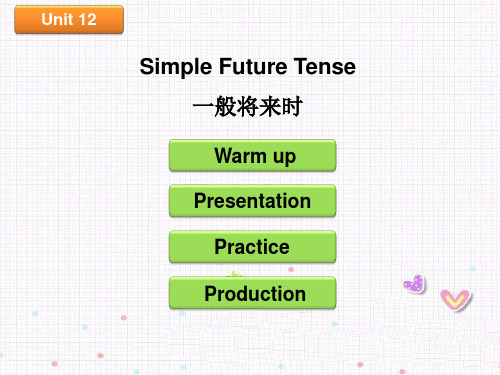小学英语一般将来时课件演示
(完整版)一般将来时课件(PPT)

①
②
③
① Who will have an English party next week ?
② What will they have next week ?
③ When will they have an English party?
2. be going to 表将来
will 和be going to 的区别
回答:(肯)Yes,主语+will. (否)No,主语+won’t.
Yes,they will./No,they won’t.
They won’t(will not) have an English party next week.
注意:won’t=will not
(3).变特殊疑问句
They will have an English party next week.
他现在在北京。 He __i_s_ in Beijing now.(be)
他昨天在上海。
He w__a_s in Shanghai yesterday. (be) Hew_i_ll_be in Shanghai tomorrow. (be)
二、一般将来时的时间状语
1.与“tomorrow一家” 连用:
buy the oranges tomorrow?
2.Who _w_i_ll_i_n_ve_n_t (invent) a new
computer in 2050? 3.We _w_il_l _g_o (go) to the cinema next
Sunday. The film _w_il_l _b_e (be) very
6. He usually _g_e_t_s (get) up at 6 in the morning. Look! He i_s_g_e_t_t_in(gget) up now. But yesterday he _g_o_t_ (get) up very late, so he _w_e_n_t (go) to
(完整版)一般将来时课件(PPT)

2.与“next一家” 连用
next
time year week month term Monday at 7:00 next Sunday morning ……
2.He will find some meat in the fridge soon. (变一般疑问句) W __i_ll he _f_in_d _a_n_y_ meat in the fridge?
3.She will stay there in a week. (对划线部分提问) __H_o_w _s_o_on_ w_i_ll__ she _s_t_a_y_ there?
We will/shall go to Beingjing next week.
He will go to Beingjing next week
(2).变一般疑问句和否定句:
They will have an English party next week. Will they have an English party next week?
2. be going to+do可表示事先计划的意图,而 will 则表示说话人当时决定的意图;
We're going to drive you home after the meeting. Don't call a taxi. We'll drive you home.
I feel ill now, and I'll go to see the doctor. I'm going to see the doctor this evening.
一般将来时课件(PPT)

“be able to”表示将来有能力做某 事时,使用一般将来时形式,例如“I will be able to help you”。
情态动词如“can”、“may”、 “must”等,在一般将来时中通常直 接加动词原形,例如“I can swim”。
03
一般将来时在句子中的运用
陈述句中的使用
表示将要发生的动作或存在的状态
纠正方法
应使用正确的将来时形式,如 "He will go to the park tomorrow." 或 "He is going to the park tomorrow."
忽略动词变化规则
错误示例
They will play football in the future.(忽略了动词play在将来时中的变化)
纠正方法
在将来时中,应使用正确的助动词或情态动词形式,如 "I will be able to help you with your homework." 或 "I can help you with your homework."
错误示例
He will must finish his work before leaving.(错误地使 用了情态动词must)
作用
用于表示未来的计划、打算、预测、 假设等。
常见表达形式
will + 动词原形
表示将来的动作或状态,如“I will go to the park tomorrow.”(我明天将去公园。)
be going to + 动词原形
表示计划、打算或即将发生的动作,如“I am going to study hard this semester.”(我这 学期打算努力学习。)
一般将来时PPT课件

•一般将来时基本概念•一般将来时结构与用法•一般将来时时间状语及标志词•一般将来时与其他时态对比•一般将来时在各类从句中运用•一般将来时误区及注意事项•总结回顾与拓展延伸目录01一般将来时基本概念定义与特点定义特点表现形式will + 动词原形be going to + 动词原形现在进行时表示将来预测未来计划与安排条件与假设030201使用场景02一般将来时结构与用法主语+ be not going to + 动词原形+ 其他成分主语+ be to not (非标准用法,尽量避免使用) + 动词原形+ 其他成分主语+ will not (won't) + 动词原形+ 其他成分Will + 主语+ 动词原形+ 其他成分?Be + 主语+ going to + 动词原形+ 其他成分?Be + 主语+ to + 动词原形+其他成分?(较少使用,多用于书面语)特殊疑问词动词原形特殊疑问词going to +成分?特殊疑问词to +(较少使用,多用于书面语)注意:在一般将来时的使用中,要注意区分不同语境和表达方式的细微差别,选择合适的结构进行表达。
同时,也要注意与其他时态的区分和联系,避免混淆使用。
特殊疑问句结构03一般将来时时间状语及标志词常见时间状语表示将来的时间状语表示计划或安排的时间状语标志词识别与运用04一般将来时与其他时态对比与现在进行时对比时间指向不同01动词形式差异02使用情境不同03时间基准差异动词形式变化使用情境区别时间范围不同动词形式区别使用情境差异05一般将来时在各类从句中运用在宾语从句中运用01 02定语从句的时态取决于它所修饰的先行词,如果先行词是将来时态,定语从句也使用将来时态。
如果先行词是过去将来时,定语从句则使用过去将来时。
定语从句中表示将来的时间状语有:tomorrow, next year, in the future 等。
06一般将来时误区及注意事项误区二过度使用“will”和“going to”。
一般将来时课件ppt(共17张PPT)

Jim going to
afternoon?
in the playground tomorrow
4. .Jim is going to play football in the playground tomorrow afternoon.
Jim going to play football tomorrow afternoon?
2)在浊辅音和元音后读/d/.
一般过去时, 要用动词过去式. Jim is going to play football in the playground tomorrow afternoon.
Jim is going to play football in the playground tomorrow afternoon. ⑵are变为were。
there were many beautiful flowers there. 一般将来时表示将来某个时间要发生的动作或存在的状态常与表示将来的时间状语连用
⑴am ,is变为was。
So she They to read some books.
What did they do in the park? 1)在清辅音后读/t/ .
(3).动词过去式变化规则
a)一般情况下,直接加ed.如:wash--washed, look---looked; b)以不发音字母e结尾的,加d.如:like---
liked, dance---danced; c)以“辅音字母+y”结尾的,变y为i再加ed. 如:study---studied;
food and (play) lots of games. They
(come) home at 4:30.
一般将来时PPT课件

一、单项选择
(C) 1. There __________ a meeting tomorrow afternoon.
A. will be going to B. will going to be C. is going to
shall常用于第一人称. shall
否定式:shall not = shan’t
will常用于第二、三人称,但在 will 口语中各种人称都可以用will.
否定式:will not = won’t
四、现_在___进__行___时态 + 表示将来的时 间状语也可以表示将来。
五、There be 句型的一般将来时态 的结构:there +is_g_o_in_g_to_ + be + 名词或there + will+ be + 名词。
begoingto表示根据主观判断将来肯定发生的事情表示根据主观判断将来肯定发生的事情will表示客观上将来势必发生的事情
The Simple Future Tense
一、一般将来时表示将来某一 时刻的动作,状态以及打算。 该时态一般与表示将来意义 的时间状语连用。如:
tomorrow, this month, the day
next week.
A. will be; is
B. is; is C. will be; will be D.
is; will be
(D) 4. There ________ a dolphin show in the zoo
tomorrow evening.
A. was B. is going to have C. will have D. is going
一般将来时公开课PPT课件

.will
2
What is she going to do?
She’s going to shop/ go shopping.
will .
3
What are they going to do ?
They are going to dance.
will.
4
英汉互译。 1.我打算下个月将去长城玩参观。 I am going to visit the Great Wall next month.
❖ She is going to play basketball next Sunday.
❖ 否定句:在be 的后面加not即可。
❖ She is not going to play basketball next Sunday.
❖ 一般疑问句:把be提到句子主语之前,结尾变问号。
❖ Is she going to play basketball next Sunday?
will he(they/she) do?) next month, tomorrow , next week , in three
days (三天后),
.
12
.
13
“There be”句型的一般将来时:表示将来某地会有某人 或某物
肯定句: There will be +名词+其他成份
There is/are going to be +名词+其他成份
What will they do this evening?
They will watch TV.
.
9
are going to
造句:(任何主语都用will+动词原形)
一般将来时ppt课件

02 一般将来时的基本用法
表示将来要发生的行为
要点一
常见的助动词“will”和 “shall”可以用于表示将…
“I will go to the store tomorrow.”(我明天要去商店。 )
要点二
“be going to”也可以用于表达 将来要发生的行…
“It is going to rain later.”(待会儿要下雨了。)
肯定句
I am going to swim in the afternoon.
否定句
They are not going to watch the movie.
疑问句
Are you going to meet your friend tomorrow?
主语+be to+动词原形
肯定句
You are to hand in your homework tomorrow.
表示邀请或建议
总结词
表示邀请或建议某人做某事,通常用于 口语交流中。
VS
详细描述
在口语交流中,我们经常使用一般将来时 态来表示邀请或建议,例如:“Would you like to come to my house for dinner tomorrow?”(明天你想来我家 吃晚饭吗?)或者“Let's go for a walk after dinner.”(晚饭后我们去散步吧。 )
02
在一些情况下,我们也可以使用“be going to”来表达将来时
。例如
It is going to rain.(将要下雨了。)
03
构成
They are going to graduate next year.(他们将于明年毕业。)
一般将来时PPT课件

05
解析
含有will的句子改为否定句时 ,在will后加not,缩写为 won't。
06
THANKS
感谢观看
06
一般将来时练习题精选与解析
选择题精选与解析
01
题目:I _______ to the cinema. Will you go with me?
02
A. go B. am going C. have gone D. went
选择题精选与解析
答案:B
解析:由后一句“Will you go with me?”可知是打算去做某事,是一般将来时,所以用现 在进行时表将来,选B。
题目:— What _______ you _______ to do tomorrow?
选择题精选与解析
— I _______ visit my uncle. A. are; going; am going B. are; going; am going to
C. are; going to; am going D. are; going to; am going to
区别
现在进行时强调当前正在进行的动作 或状态,而一般将来时则强调未来将 要发生的动作或状态。
联系
两者都可用于表示将来的情况,但侧 重点不同。现在进行时通过现在正在 进行的动作暗示将来,而一般将来时 则直接表达将来的动作或状态。
与过去将来时的区别与联系
区别
过去将来时表示从过去某一时间 看将要发生的动作或状态,而一 般将来时则是从现在看将来要发 生的动作或状态。
表示将来经常发生的动作或习惯
常用的时间状语
always, often, usually等 。
句子结构
一般将来时态ppt课件

you
are
(b精e选)ppnt课o件t2b02e1 tter in the evening. 8
• 3.其他一般将来时态结构
• 1.现在进行时表将来(be + doing) • 表示某个按最近的计划或安排即将要进行的动作,an arrangement
for the near • future或即将开始或结束的动作。
• 常用动词位置移动词:go, leave, come, arrive, land, meet, move, return, start, stay, stop, do, dine, give, have, pay, join, publish, spend, sleep, take, change, fly, work, wear, see, play etc.
shall适用于第一人称I,We;而will适用于所有人称。
通常可以用will来代替shall。
will,shall均可缩写为:'ll,如:
I will= I'll;
she will = she’ll;will not 和shall not分别可以
缩写为 won't 和精s选happnt课't件。2021
不能在条件状语从句中表示将来
能在条件状语从句中表示将来
在含有条件状语从句或时间状语从句的复合句中,从句
用一般现在时,主句用一般将来时,且用will而不用be If you are going to attend the meeting,
going to.
you'd better leave now.
2. be going to + 动词原形。 表示(1)打算或准备要做的事情 (2)在客观情况下(非主观打算)要发生的事情。
一般将来时课件PPT.上课用

与“be going to + 动词原形”和“will + 动词原形”相比,“be about to + 动词原形”更强调即将发生的紧迫性。
04
一般将来时的否定形式
will not = won’t
01
"will not" 是 "will" 的否定形式 ,表示将来某个时间不会发生某 件事情。
明年这个时候我们将在巴黎度假。
表示未来的时间状语从句的连用
一旦你完成这个项目, 你就可以休息了。
即使明天下雨,我们 也会按时举行运动会。
只要他一回来,我们 就出发。
表示未来的时间状语从句的省略
明天见。 下周再见。
明天这个时候我们会在飞机上。
THANKS
主语 + will not + 动词原形 + 其他成分,例如:He will not come back until next month.(他下个月之前不会回来。)
Will + 主语 + 动词原形 + 其他成分,例如:Will you be available this afternoon?(你今天下午有空吗?)
表示预测和推测
总结词
一般将来时也可以用来表示对未来的预测和推测,通常基于 某种事实或证据。
详细描述
当我们根据已知事实或证据推断某件事情将在未来发生时, 可以使用一般将来时。例如,“根据天气预报,明天会下雨 ”表示对天气的预测,“根据市场趋势,明年房价可能会上 涨”表示对未来的推测。
表示意愿和打算
05
一般将来时的疑问形式
will + 主语 + 动词原形?
总结词
小学英语语法课件- 一般将来时 (共36张PPT) 全国通用

Presentation Sentences
She will take swimming lessons in this vacation. 她今年假期要去学游泳。 She is going to go shopping tomorrow. 她明天要去购物。 Jim will open a shop on internet. 吉姆打算要在网络上开个店。 Jim is going to be an actor when he grows up. Jim长大了想当一名演员。
___t_o_m_o_r_ro_w_.____________________________ 一般疑问句:A__re_t_h_e_c_h_il_d_re_n_g_o_i_ng__to__w_a_tc_h_a_d_o_l_p_h_in_s_h_o_w__
t_o_m_o_r_ro_w_?____________________________ There will be a great concert next week. 否定句:_T_h_e_r_e_w_il_l _n_o_t b_e__a_g_re_a_t_c_o_n_ce_r_t _n_ex_t_w_e_e_k_. ______ 一般疑问句:_W_i_ll_th_e_r_e_b_e_a_g_r_e_a_t _co_n_c_e_rt_n_e_x_t_w_e_e_k?______
Practice Oral Practice
小组合作完成单项选择,并朗读句子
( C ) There __________ a meeting tomorrow afternoon.
A. will be going to
B. will going to be
C. is going to be
一般将来时课件(共12张PPT)

五、用“be+动词不定式”或用“be about to +动词原形”的结构表示。如:
1. He is to visit Japan next year. 明年他
2. They're about to leave. (=They're leavi
请认真观察答句,根据答句写出问句。
are you going to do tomorrow? 1\ What __________________________________ We are going to take a trip tomorrow. 2\ __________________________________ What is Sarah going to buy? Sarah is going to buy a comic book . 3\ __________________________________ Where are they going this evening? They are going to the cinema this evening. When is Mike going to the park? 4\ __________________________________ Mike is going to the park next week. How are you going to the zoo? 5\ __________________________________ I’m going to the zoo by bike. 6\ _________________________________ Are you going to read books tonight? Yes, I am going to read books tonight. Is she going to play football after school? 7\ _________________________________ No, she is going to play basketball after school. Do you go there by bus? 8\ __________________________________ No, I go there on foot.
一般将来时课件(PPT)

现在进行时表示
总结词
表示现在正在进行的动作,暗示将来还会继 续
详细描述
现在进行时可以用来表示现在正在进行的动 作,并暗示将来还会继续。例如,“I am studying for the exam next week.”(我 正在为下周的考试学习。)
一般现在时表示
总结词
表示现在经常发生的动作或存在的状态,暗 示将来也会如此
详细描述
使用"will+动词原形"的结构来表示将来 某个时间点将要发生的动作或状态,例 如"I will go to the park tomorrow." (明天我将去公园)。
be going to+动词原形
总结词
表示计划或安排将来要发生的动作或状态。
详细描述
使用"be going to+动词原形"的结构来表示计划或安排将来要发生的动作或状 态,例如"I am going to have a party next weekend."(下周末我将举办一个 聚会)。
详细描述
使用“be going to+动词原形”的结构来表示计划或安排将来发生的动作,例如“We are going to have a par来某个时间正在进行的动作。
详细描述
使用现在进行时来表达将来某个时间正在进行的动作,例如“I am meeting my friend tomorrow” 。
一般将来时课件
目录
• 一般将来时的定义 • 一般将来时的句型结构 • 一般将来时的肯定句 • 一般将来时的否定句 • 一般将来时的疑问句
01
一般将来时的定义
什么是将来时态
01
一般将来时课件(PPT)

一般将来时的特殊疑问句形式
Will + 主语 + 动词原形 + 其他?,用于询 问将来某个时间是否会发生某个动作或存 在某个状态。
特殊疑问词 + will + 主语 + 动词原形 + 其 他?,用于对将来某个时间发生的动作或状 态进行具体询问。
相关语法点串联
与一般现在时的对比
一般现在时表示经常性、习惯性的动作或状态,而一般将 来时则表示将来某个时间要发生的动作或存在的状态。
01
2. 题目
They _____ (not visit) their grandparents next week.
03
3. 题目 you (have) a meeting next Monday?
05
02
解析
根据时间状语tomorrow可知,该句应用一 般将来时,填will go。
04
解析
根据时间状语next week可知,该句 应用一般将来时的否定形式,填 won't visit。
Be (Am, Is, Are) + 主语 + going to + 动词原形 + 其他成
分?
Will there be + 主语 + 其他成 分?
03
时间状语从句与主句时态关系
主将从现原则
常见的引导词有
when, as, after, before, until, unless, as soon as 等。
特殊情况处理
01
例子
02
You can call me when you are passing my house. (当你经过我 家时,你可以给我打电话。)
一般将来时课件PPT

情态动词练习
总结词
理解情态动词在否定句中的作用
详细描述
解释情态动词如"can't", "won't", "shouldn't"等在否定句中的用法,并 通过例句和练习加深学生对情态动词 的理解。
助动词will练习
总结词
熟悉助动词"will"的否定形式
详细描述
介绍助动词"will"的否定形式"won't", 并通过例句和练习让学生熟练掌握其 用法,如"He won't come tomorrow."等。
助动词will练习
总结词
掌握助动词的用法
详细描述
通过助动词"will"的练习,学生可以进一步了解助动词在一般 将来时中的用法。学生将学习如何正确使用助动词与其他时 态连用,如过去将来时和将来完成时。
05
一般将来时的否定句练习
简单句练习
总结词
掌握简单句的否定形式
详细描述
通过例句和练习,让学生掌握一 般将来时的简单句否定形式,如 "I will not go to the party."和 "She will not buy that car."等。
结构
一般将来时的基本结构是“主语+will+动词原形”,有时也可以用“be going to+动词原形”来表示。
特点
预测性
不确定性
一般将来时主要用来表示对未来的预 测,包括个人的预测、科学的预测和 基于事实的预测。
一般将来时也可以表示对未来事件的 不确定性,例如“I will see you later, but I'm not sure when.”。
英语语法一般将来时 课件 (共35张PPT)

选择:要动动脑啦
1. My younger brother ____be 15 years old next year.
A. will B. is going C. should
2. — Sorry, I forgot to post the letter for you.
— Never mind, _____ post it myself tonight.
Vicky w__ill__be_ 15 years old next year.(be) Vicky 明年15岁了
Will 表示单纯“将要,将来会”无计划性,陈 述事实
三、句型变化 1. 肯定句: 主语+ will +V原型
I will be a teacher in the future. 2.否定句:主语 + will not(won’t)+V原型
be 随主语有am is are 变化
1. 肯定句: 主语 + be going to + V原型
I am going to fly kites the day after tomorrow.
2. 否定句:主语 + be not going to + V原型
She is not going to be a doctor when she grows up.
B: He will go to Australia. A:What will he do?
B: He will see kangaroos
2.be going to+动词原形
be going to ①表示计划,安排要做的事 ②表示现在的迹象推断未来可能
一般将来时小学 ppt课件

精品资料
1. will 引导的一般将来时:表示将来发生的动作或存在的状态,最基本的结 构:will + 动词原形
“主谓(宾)句型”的一般将来时:
肯定句:主语+ will +动词原形+(宾语)+其他
Some day people will go to the moon .
否定句:主语+ will +not+动词原形+(宾语)+其他. 在will 的后面加not即可。will not 可缩写为 won’t
2020/10/22
一般将来时小学
9
4.一般将来时两种基本句式的区别:
①be going to+动词原形”和“will+动词原形” 这两种表示将来时态的结构没什么区别。但在 现代英语中,特别是在口语中,表示将来时多 用“be going to+动词原形”这一形式。
②另外他们主要区别在于“be going to+动词 原形”表示一个事先考虑好的意图,相当于 “打算、计划、准备”,而will则表示未经事 先考虑的意图。
意为“打算;就要”。如:
1. We're going to meet outside the school gate. 我们打算在校门口见面。
2. Look! It's going to rain. 瞧!快下雨了。
2020/10/22
一般将来时小学
11
三、用现在进行时表示。 表示位置转移的动词(如:go, come, leave, start, arrive等), 可用现在进行时表示将来时。如:
2. The rain will stop soon. 雨很快就要停了。
- 1、下载文档前请自行甄别文档内容的完整性,平台不提供额外的编辑、内容补充、找答案等附加服务。
- 2、"仅部分预览"的文档,不可在线预览部分如存在完整性等问题,可反馈申请退款(可完整预览的文档不适用该条件!)。
- 3、如文档侵犯您的权益,请联系客服反馈,我们会尽快为您处理(人工客服工作时间:9:00-18:30)。
•I’ m going to buy a book. •I’ m going to take a look. •I’ m going to bake a cake. •I’ m going to walk near a lake. •We’ re going to take a trip. •We’ re going to take a sip. •I’ m going outside to play. •I’ m going to have a good day.
在什么时候 (提问时间) 选择哪一个(提问人或物) 谁 (提问人) 怎么样 (提问方式)
疑问词在句首,系动词be跟着走, 主语、going紧相随,其它成分不要丢。
顺口溜小记:
不久将要发生事,记住要用将来时。 be后紧跟going to,to后跟着动原形。 be有形式多变化,记得随着主语及时变。
I+am He/She+is You/We/They+are 某个人名+is如:Mike is
主语+be going to +动词原形+时间副词。
主语+will +动词原形+时间副词。
人称主语: 单数 第一人称: I 第二人称: you 第三人称: he\ she\
it\ (人名)
复数 we
you they
be 动词: am (与第一人称搭配) are (与第二人称或所有复数主语) is (与第三人称或者所有单数主语)
What is Xi Yangyang going to do?
He is going to wash the clothes.
What is Lan Yangyang going to do?
He is going to swim.
What is Fei Yangyang going to do?
火眼金星。看看下面的句子病在哪里呢?
1. We are going tovigsritandparents tomorro 2. She isgoing to go soon. 3. He is going toreabdooks this evening. 4. My parents is going to Beijing next we
They are going to ride a bike. They will ride a bike.
What is Hui Tailang going to do?
He is going to ski.
What is Lan Yangyang going to do?
He is going to sweep the floor.
/ year, this afternoon/ evening….等。
结构:主语+be动词+going to +动词原形+时间副词
主语+ will+ 动词原形+时间副词
例如:Jim is going to play football. Jim will play football.
否定形式:把be动词或will后面加not 例如:Jim is not going to play football.
He is going to catch butterflies.
Be going to 句型
be going to +动词原形:用来表示近期将要发生的动作, 或打算要做的事。
Will 译成 将要
经常跟一些表示将来时间的时间状语如:tomorrow、 this weekend、next week等连用,用来表示一般将 来时态。
Be going to句型的特殊疑问句形式。
疑问词 + Be动词 +主语 + going (to) +(动作)+(时间副词)?
W常he用re的疑are问词有y:ou going to play
tonight ?
what where when which who how
什么(提问事情) 在哪里 (提问地点)
我打算明天写作业。 他将要下周上学。 他们打算今晚看电视。
一般将来时(the future tense)
一般将来时表示将要发生的事或打算、计划
决定要做的事情。常与表示将来的时间状语连用。
标志性词:tomorrow, next, soon, tonight, next week/ weekend/ month
一般将来时:
构成:be going to + 动词原形
I am going to listen to music.
一般将来时:
构成:will + 动词原形
I will listen to music.
一般将来时的标志:
this evening, next week等。
构成:
be going to /will+ 动词原形+将来的时间 I will play football this afternoon. I am going to wash clothes next week.
Jim will not play football. 一般疑问句:把be动词或will调到句首, 例如:Is Jim going to play football?
Will Jim play football?
小练笔:
并变否定句、一般疑问句
1、我打算明天去打扫我的房间。
I'm going to clean my room tomorrow.
将来的时间:
this afternoon
this evening tonight
tomorrow
next week
next weekend next hol等
next year
What are they going to do? What will they do?
2、他这个周末准备去拜访他的祖父母。 He is going to visit his grandparents this weekend.
3、他们下周去旅行。
They are going to take a trip next week.
一般将来时的构成:
主语 + be going to + 地方 / 动词原形+(将来时间)…..
